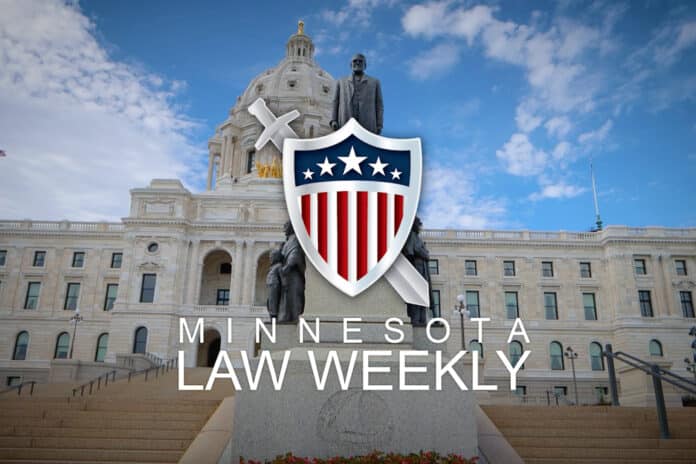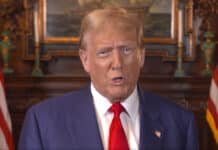This is a transcript from Minnesota Law Weekly, a podcast from the Upper Midwest Law Center.
Hi, I’m Allie Howell, Trial and Appellate Counsel for the Upper Midwest Law Center, Minnesota’s non-profit public interest law firm that fights for liberty and the rule of law. As those of you who follow UMLC know, I just joined the team this September, and I am excited to be on board. I’m currently licensed to practice law in Washington, D.C. and am looking forward to approval of my Minnesota bar application. I’m also excited to be joining you for my first episode of Minnesota Law Weekly, where we update you on important developments on legal issues in Minnesota and how we at UMLC are your voice fighting for you in the courts.
Today, we are talking about the latest development in a Minnesota lawsuit seeking to keep former President Donald J. Trump off the ballot. The Minnesota Supreme Court heard arguments in the case last week and has already issued a short order allowing former President Trump to remain on ballots in Minnesota, at least for the 2024 presidential primary.
As we have previously discussed on Minnesota Law Weekly, a group of Minnesota voters filed a petition earlier this fall seeking to bar former President Trump’s name from appearing on ballots in Minnesota because he is ineligible for office. Their legal theory was based on the rarely used insurrection clause of the Fourteenth Amendment which prevents individuals who have “engaged in insurrection or rebellion” from holding certain offices in the United States.
But to bring a Petition directly to the Minnesota Supreme Court, the Petitioners also had to rely on state law. To support their right to sue, they relied on Minnesota Statutes Section 204B.44 which authorizes a petition to correct an “error … which [has] occurred or [is] about to occur.” The “placement of a candidate on the official ballot who is not eligible to hold the office” is one such error.
The problem, according to the Minnesota Supreme Court, is that there was no “error” to correct yet. The presidential primary is not an official ballot but is instead a process that allows political parties to select delegates. As the Minnesota Supreme Court explained, “although the Secretary of State and other election officials administer the mechanics of the election, this is an internal party election to serve internal party purposes, and winning the presidential nomination primary does not place the person on the general election ballot as a candidate for President of the United States.” That decision is up to the political party alone. And there is no state statute preventing a political party from placing a candidate on the primary ballot who is actually ineligible for office.
The Minnesota Supreme Court said nothing about whether former President Trump could appear on the 2024 general election ballot. The voters’ claim regarding that election was, according to the Court, not yet ripe, meaning it was still too early for the court to make a decision. Although it looks likely, there is still no guarantee that former President Trump is the 2024 Republican candidate for president.
If former President Trump is the candidate, nothing the Minnesota Supreme Court said this week prevents the voters from trying again. At oral arguments last week, however, the justices of the Minnesota Supreme Court appeared skeptical that the voters’ legal theory could succeed, even if the petition was brought at the right time.
For starters, Section 3 of the Fourteenth Amendment says nothing about who is responsible for deciding that an individual is ineligible for office. And allowing different state Supreme Courts to make that decision in a federal election could be quite messy. At oral arguments, Chief Justice Natalie E. Hudson recognized that there could potentially be “chaos” if 50 different states were asked to decide if former President Trump was eligible to run for president.
“[S]hould we do it, even if we could it?” she asked.
Similarly, Justice Paul C. Thissen and Chief Justice Hudson asked multiple questions about the role of Congress in determining who is eligible to hold federal office. As Chief Justice Hudson explained, many constitutional provisions, such as Congress’s impeachment power, indicate that there “is a fundamental role for Congress to play, and not the states.” In other words, enforcing Section 3 of the Fourteenth Amendment may be up to Congress. That is exactly what the chief justice of the United States Supreme Court decided in an 1869 case called Griffin’s Case. That decision is not binding on the Minnesota Supreme Court in this case, but is, as former President Trump’s counsel argued, highly persuasive evidence of how Section 3 works. It is unlikely that the justices will be quick to ignore what Griffin’s Case says.
These questions suggest that should the voters try again, the Minnesota Supreme Court will likely find a different reason to dismiss the petition. In the meantime, we must wait and see how the presidential primary plays out. The Minnesota Supreme Court’s order was based entirely on the fact that placing former President Trump on the 2024 primary ballots, even if he is ineligible for office, does not violate state law. So there is currently nothing for the U.S. Supreme Court, a court that only decides matters of federal law, to review on appeal. The Minnesota Supreme Court gets to make final decisions on Minnesota law, and, at least for now, Minnesota law allows former President Trump to be on the ballot.
Meanwhile, there are similar lawsuits across the country at various stages of litigation. In Colorado state court, for example, a weeklong trial featuring testimony from legal scholars, U.S. Capitol Police officers, and House lawmakers ended last week. And, in West Virginia federal court, a lawsuit has gotten personal with a Plaintiff attacking the West Virginia GOP with what a federal judge has called “inappropriate attacks” and “derisive commentary.” The judge warned the Plaintiff that the “Court’s docket is not a social media feed” and promised to strike further “snide and malicious comments” from the record. This spectacle across the nation demonstrates the danger of allowing the electoral process to play out in the courtroom.
That’s it for this week on Minnesota Law Weekly. You can learn more about the Upper Midwest Law Center by visiting umlc.org, and you can also make a confidential, tax-deductible donation on our website or by sending us a check to 8421 Wayzata Blvd., Suite 300, Golden Valley, MN 55426. And we would urge you to do that. We are fully donor supported and charge our clients nothing. We are standing up for you in court and want to fight for you on every front. Help us do more for you by making a donation today. Thank you, and we’ll see you next week.
















